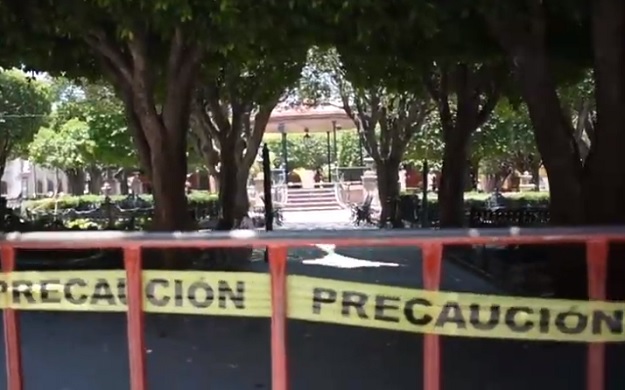Alejandro Fox, an amputee in Playa del Carmen on Mexico’s Yucatan peninsula, has prepared meals every day for the last 14 years with his wife to sell to workers and tourists on one of the city’s main streets.
Each morning Fox, 64, rises at 6 a.m. and spends the next 15 hours cooking and selling his homemade meals of carne asada, beef barbacoa, and chicken moles with salsa and salads.
Since early April, that street has been closed, his customer base gone, and Fox has been left to deliver between five and six meals a day, earning about $400 pesos (20 USD) in a good day, to whatever remaining clients he can find.
“The impact of this pandemic has been very difficult,” Fox said. “They have closed everything — all the established businesses, craft shops, places where they sell snorkeling tours — everything has died.”
The COVID-19 virus has been devastating worldwide, but while in the U.S. a significant portion of the population has been able to telework or receive some government assistance, Mexico’s large informal economy has meant little or no safety nets. In Mexico, about 56 percent of the population is either self-employed or works for small family businesses that are out of the formal tax system — a status known as the informal sector.
Many of these jobs provide workers with a day-by-day income, with little or no savings, no unemployment compensation or health benefits, and no backup for the kind of self-isolation measures that have been recommended by Mexico’s federal government and made mandatory by several states, including Quintana Roo, where Playa del Carmen is located.
“The current situation is horrible for the informal economy, because there is no tolerance for the way these businesses operate: everything you do requires hand-to-hand distribution, close quarters, face-to-face,” said Harry Jones, a human resources attorney who specializes in Mexican labor issues.
President Andrés Manuel López Obrador’s administration has been criticized for its low level of economic aid to help businesses like that of Fox, which supports him and 11 family members in his household.
While the U.S. has spent nearly 15 percent of its annual GDP to boost the economy by helping those hit hard by the virus, Mexico’s spending has been less than 2 percent of its GDP. There have been no cash payouts to small businesses or families.
“In Mexico, we have not developed the means for transferring funds to informal sector workers in this crisis,” said Santiago Levy, a former Finance Ministry official and expert on poverty on Mexico, in a recent webinar on the crisis in Mexico. “In Brazil, in Peru, they are making these kinds of transfers. As a result, in Mexico the isolation cannot be as strict as it is in other countries.”
López Obrador has publicly stated his resistance to Mexico taking on debt because of the virus and there has been no significant intervention for its businesses, whether formal or informal.
“What you really need in Mexico is a fiscal stimulus,” said Manuel Molano, the director of the Institute of Mexican Competitiveness. “In the U.S., if you are a small business and you are in trouble because of the pandemic, you will get a soft loan, and that loan might be subsidized. We don’t have anything similar.”
The only available assistance to these small businesses from the federal government is coming in the form of a $25,000 peso loan (about $1,000 USD), with 6 percent interest and repayment to begin in three months.

“I don’t know anyone who has gotten a loan,” said Arturo Buenrostro, an artisan in San Miguel de Allende, whose recycled materials shop was forced to close, and has left him struggling to pay his 15 employees. “All the loans are with papers, you need to show papers. You need to show ID and home information and telephone information. And you need to show that you are paying taxes.”
Mexican economists say that this kind of loan program falls short of the kind of assistance the most vulnerable informal sector businesses would need to survive.
“The lack of government intervention for these businesses is inexplicable,” said Beatriz Leycegui, a former trade ministry official. “It is impossible for these micro-businesses to be able to address the situation by themselves. The amount of cash flows that they have only allows them to survive a couple of weeks, at the most six weeks. Companies are shutting down.”
And it is expected to leverage a heavy blow to the Mexican economy, which is expected to contract 6 to 8 percent this year, as informal and formal businesses fold.
Source: https://www.expressnews.com/
